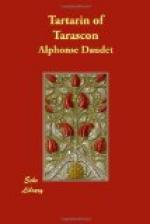All in all a very fine prince this Gregory. While sipping his wine he listened patiently to Tartarin, who told him of his Moorish love, and as he claimed to have contacts among these ladies, he even undertook to help look for her.
They drank long and deep. They drank to the ladies of Algeria. They drank to free Montenegro. Outside, below the terrace, the sea rolled, the waves slapping wetly on the beach. The air was warm, the sky bright with stars, in the plane trees a nightingale sang... It was Tartarin who paid the bill.
Chapter 21.
The Montenegrin prince was as good as his word. Shortly after the reunion at the Restaurant des Platanes he arrived early one morning at Tartarin’s room. “Quick!... quick!... get dressed” he said, “Your Moor has been found... her name is Baia... as pretty as a picture, twenty years old and already a widow.” “A widow!.... Well that’s a bit of luck” Said Tartarin who was a little uneasy at the thought of Moorish husbands. “Yes, but closely guarded by her brother” “Oh! That’s a bit awkward” “A ferocious Moor who sells hookahs in the bazaar” There was a silence, “Good!” Said the prince, “You’re not the chap to be put off by a little thing like that, and anyway we can perhaps buy off this villain by purchasing some of his pipes. So come on, get dressed... you lucky dog!”
Pale and excited, his heart full of love, Tartarin jumped out of bed and as he climbed into his ample underwear he asked “What shall I do now?” “Write to the lady quite simply and ask for a meeting” “She understands French then?” Said Tartarin with an air of disappointment. For his dreams had been of an Arabian Houri, uncontaminated by the west. “She doesn’t understand a word” Replied the prince imperturbably, “but you will dictate the letter to me and I shall translate it.” “Oh prince, how good you are.” And Tartarin strode about the room silent and deep in thought.
As you may imagine one does not write to a Moorish lady as one might to a little shop-girl in Beaucaire. Happily our hero was able to cull from his reading many phrases of oriental rhetoric and combining these with some distant memories of the “Song of Songs” he was able to compose the most flowery epistle you could wish for, full of unlikely similes and improbable metaphors. With this romantic missive Tartarin would have liked to combine a bouquet of flowers with emblematic meanings, but prince Gregory thought it




